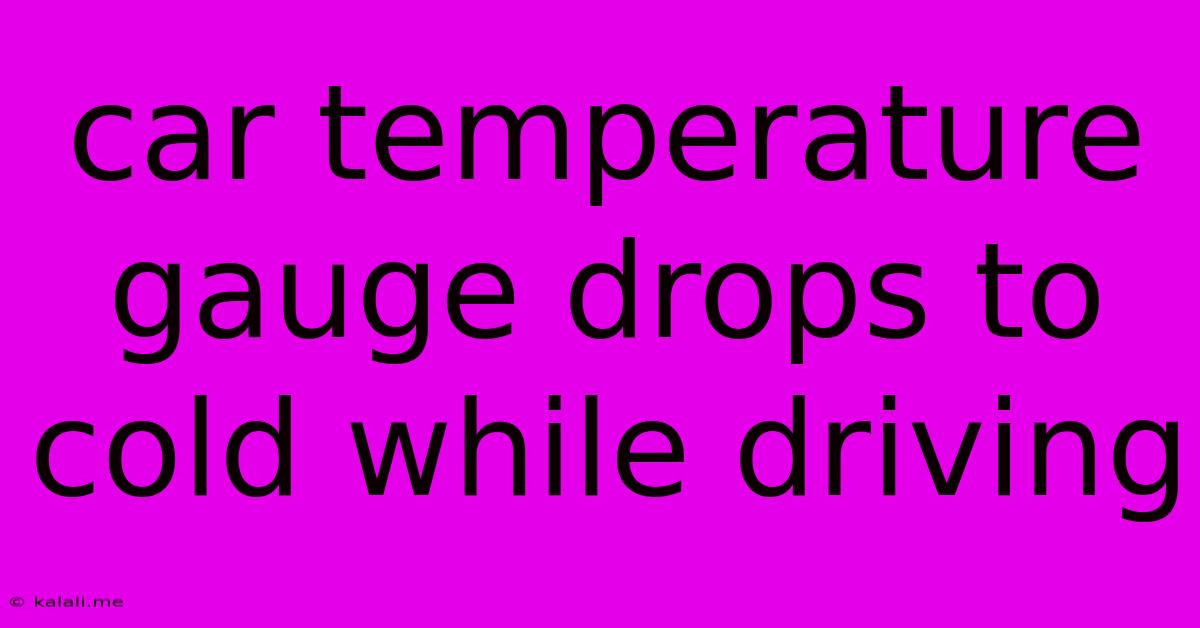Car Temperature Gauge Drops To Cold While Driving
Kalali
May 25, 2025 · 3 min read

Table of Contents
Car Temperature Gauge Drops to Cold While Driving: What to Do?
Seeing your car's temperature gauge plummet to cold while driving can be alarming. This isn't just an inconvenience; it signals a potential problem that could lead to serious engine damage if ignored. This article will explore the common causes of this issue, helping you understand what's happening and what steps to take. Ignoring a malfunctioning temperature gauge could result in costly repairs, so understanding the underlying causes is crucial for preventative maintenance.
Common Causes of a Dropping Car Temperature Gauge
Several factors can cause your car's temperature gauge to suddenly drop to cold while driving. These range from relatively minor issues to more serious problems requiring immediate professional attention. Let's break down the most frequent culprits:
-
Faulty Temperature Sensor: This is often the culprit. The temperature sensor measures the coolant temperature and sends this information to the gauge. A malfunctioning sensor will provide inaccurate readings, potentially showing a falsely low temperature. This is a relatively inexpensive and easy fix.
-
Low Coolant Levels: Insufficient coolant means less liquid to absorb heat from the engine. Low coolant levels can cause the gauge to drop, and more critically, lead to overheating if not addressed promptly. Check your coolant reservoir regularly.
-
Coolant Leak: A leak in the cooling system will cause a loss of coolant, leading to inaccurate temperature readings and potentially serious overheating. Look for signs of coolant leaks, such as puddles under your car or white smoke from the exhaust.
-
Thermostat Issues: The thermostat regulates coolant flow. A stuck-open thermostat allows coolant to constantly circulate without reaching optimal operating temperature, resulting in a low reading on the gauge. A faulty thermostat needs replacing.
-
Water Pump Failure: The water pump circulates the coolant. A failing water pump will impede coolant flow, resulting in inaccurate temperature readings and potential engine damage. A grinding or whining noise from the engine could indicate a water pump issue.
-
Wiring Problems: Damaged or corroded wiring connected to the temperature sensor or gauge can interrupt the signal, leading to an inaccurate reading. A qualified mechanic can diagnose electrical problems.
Diagnosing the Problem: Steps to Take
If your car's temperature gauge drops to cold while driving, take the following steps:
-
Pull Over Safely: Immediately pull over to a safe location, turn off the engine, and assess the situation. Do not continue driving with a malfunctioning temperature gauge.
-
Check Coolant Levels: Carefully inspect the coolant reservoir. Low levels indicate a leak or other problem requiring immediate attention. Never open the radiator cap while the engine is hot.
-
Inspect for Leaks: Look for any signs of coolant leaks under the car. Look for any visible signs of damage to hoses or other components of the cooling system.
-
Consult a Mechanic: If you're not comfortable diagnosing the issue yourself, take your car to a qualified mechanic for a professional inspection and repair.
Preventing Future Issues: Regular Maintenance
Regular car maintenance is key to preventing many of these problems. This includes:
- Regular Coolant Flushes: Flushing your coolant system removes contaminants that can damage components and reduce efficiency.
- Visual Inspections: Regularly inspect hoses, belts, and other components of the cooling system for signs of wear and tear.
- Scheduled Maintenance: Adhere to your vehicle's recommended maintenance schedule to ensure everything is functioning correctly.
Ignoring a car temperature gauge that drops to cold while driving can have severe consequences, potentially leading to expensive engine repairs. By understanding the common causes and taking the appropriate steps, you can prevent costly damage and ensure the longevity of your vehicle. Remember, prevention is always better than cure when it comes to your car's health.
Latest Posts
Latest Posts
-
Rover Sliding Around When Parked Space Engineers
May 25, 2025
-
How Long Does Tuna Fish Salad Last
May 25, 2025
-
Page Up And Down On Mac
May 25, 2025
-
How Do You Make The Color White
May 25, 2025
-
Why Did Daenerys Burn Kings Landing
May 25, 2025
Related Post
Thank you for visiting our website which covers about Car Temperature Gauge Drops To Cold While Driving . We hope the information provided has been useful to you. Feel free to contact us if you have any questions or need further assistance. See you next time and don't miss to bookmark.